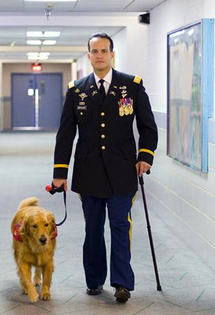
A soldier's best friend
When we did a story last year on what a boon dogs are becoming for troops coming home from the wars with Post-Traumatic Stress Disorder, Luis Carlos Montalvan was one of the soldiers we interviewed. He served as an Army captain in Iraq, where he garnered the Combat Action Badge, two Bronze Stars, and the Purple Heart — as well as a case of PTSD. As often happens, our conversation ended up on the cutting room floor. But Montalvan gets the last word: he has just published Until Tuesday: A Wounded Warrior and the Golden Retriever Who Saved Him. Here’s a recent email exchange between Montalvan and Battleland:
Why did you write this book?
Until Tuesday was written because, after having been in the darkest depths of PTSD — where I wasn’t quite suicidal but often felt death would be a relief — I know how valuable information is. In those days, it was often internet-based stories and messages from other suffering veterans that helped me through. With Until Tuesday, I wanted other veterans to understand that their symptoms are real; their struggles are shared; and that there is help and hope—even if the VA is letting them down over and over again. I also wanted the family members of veterans better understand that their loved ones are dealing with. There are 18 suicides a day among veterans. I’d do anything to help prevent that tragedy. The book also, in the end, turned out to be very effective therapy for me—even though it was the most difficult and painful therapy I’ve ever endured.
How does Tuesday help with your daily life?
He helps me with daily physical tasks, like picking things up and balancing on stairs, but more importantly he is my constant companion. I was very prone to panic-attacks, agoraphobia, flashbacks, and “gray outs” where I would lose track of where I was or what I was doing.
Tuesday keeps me in the moment. He is trained to monitor my breathing and heart rate, so he can nudge me back to reality before a situation starts. I was also prone to hyper-vigilance; now, I can put my hand on Tuesday and feel calmness returning to me mind. That may not sound like much, but for the two years before I adopted Tuesday, I was too paranoid and withdrawn to leave my apartment. I lived like a hermit, cut off even from my family. Tuesday has helped me reconnect with the world.
How do dogs help vets with PTSD and other problems?
Many veterans have serious physical problems, and their service dogs help them function. My friend, Mary, for instance, had both arms blown off above the elbow by an IED; her dog Remy performs many of her daily tasks. But for all veterans, I think, the companionship and unwavering support mean the most. So many veterans are isolated and withdrawn when they return. A dog is a way to reconnect, without fear of judgment or misunderstanding.
Are dogs being used widely enough to help troops such as yourself? Why or why not?
I wish more trained dogs were being used to help veterans, because I know they save and transform lives. With so many suicides, not to mention divorces, alcohol problems, and wrecked lives, how can we say we are doing enough of anything for our veterans? Information about dogs like Tuesday is a big problem—one I hope the book helps correct—but money is another. It’s expensive to train a service dog, and dedicated people like Lu Picard at ECAD [Educated Canines Assisting with Disabilities] (who trained Tuesday) need more resources and support.

Tuesday...and Luis Carlos Montalvan
What has been the military’s and VA’s reaction to this kind of therapy?
The government is moving very slowly to embrace service dogs, but they are moving, because the healing power is obvious. There’s a study being funded right now, thanks to Senator Al Franken, to assess the efficacy of service dogs, and I think at the end of it the dogs will be incorporated somehow into the VA system. But that is at least a year away and by then, at the current rate, more than 6,000 veterans will have committed suicide.
What do your former comrades think of it?
Most of my comrades have been supportive and a few have even gotten service dogs themselves. Additionally, I’ve heard from hundreds of other veterans and especially their loved ones. So many of them are moved to tears by my story, because it is their story, too, and someone is finally telling it.
I’ve had people write to tell me the book saved their lives, or that they now feel they can have a relationship with the child, husband, spouse or friend they thought they had lost. This whole process has been hard, because PTSD can be paralyzing and make me feel vulnerable, but these responses give me the strength to go on.
What’s the most important thing for folks to understand about the benefits of having a dog help vets with PTSD?
That the pain is real, but also the healing. That this is a friendship and a partnership, but also a medical therapy, so please don’t look down on someone for having a service dog or deny them basic rights like access to businesses, restaurants, and public transportation. Equal rights and respect, that’s all we ask.
Is a dog better than a spouse in dealing with the challenges of PTSD?
Sadly, my marriage failed during my first tour in Iraq, so how should I know! But seriously, PTSD takes a very heavy toll on loved ones. They don’t truly understand what is happening, and the PTSD often ends up destroying their lives as well. (Until Tuesday can help them, I hope.) So there’s no way a spouse can give the patience or unconditional love of a dog. That’s just too much to ask. But there is nothing—nothing—better than a loving spouse, whatever your pain. For me, a great dog and an understanding wife would be ideal.


